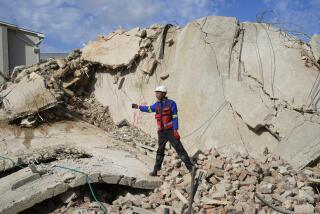Owner of collapsed building in Bangladesh is arrested
- Share via
NEW DELHI, India –- The owner of a collapsed building in Bangladesh was arrested Sunday near the Indian border as the death toll rose to at least 370 in the nation’s worst garment industry disaster. With more than 800 people still missing and time running out, rescue officials fear the number could rise sharply.
[Updated 11:45 a.m. PDT, April 28: Fire broke out in the collapsed building late Sunday night local time, Associated Press reported, forcing a halt to rescue efforts as smoke poured from the stacked slabs of concrete. A rescuer told AP that the fire began when workers tried to cut through a steel rod to reach a trapped woman, and sparks ignited the wreckage. The extent of the fire was not immedately clear.]
Sohel Rana, landlord of the pancaked Rana Plaza, was trying to flee the country when he was detained in the border town of Benapole, police said. Rana is reportedly an official with the ruling party who went into hiding soon after he was rescued from the wreckage of his own building. Local news photos showed him wearing a black and white printed shirt as he was taken into custody by two men in plain clothes.
“He has been arrested and will be tried,” Bangladesh’s deputy home minister, Shamsul Haque Tuku, told reporters.
Rana Plaza, housing five apparel factories supplying western brands, a shopping plaza and a bank branch, developed cracks Tuesday, according to local media reports. Police condemned the eight-story building, but some factory owners reportedly ordered workers back to their sewing machines just hours before the massive structure collapsed. Reports said an illegal ninth story was under construction.
Disaster Management Minister Abul Hasan Mahmood Ali said Sunday the structure didn’t meet building code requirements, was never approved by the government and was built on a wetland using substandard construction materials. The revelations are likely to fan public outrage that’s been burning for days.
In addition to Rana, authorities have arrested three factory owners and two government engineers in the growing national crisis. Local media reported that Rana’s mother died of a heart attack on Saturday evening.
Meanwhile, fewer people are being pulled out alive with each passing day. The five rescued Sunday compared with approximately two dozen on Saturday and more than 70 on Friday.
“The chances of finding people alive are dimming,” said Maj. Gen. Chowdhury Hassan Sohrawardi, the army official coordinating the rescue operation. “So we have to step up our rescue operation to save any valuable life we can.”
Local television footage showed large cranes parked outside the building. Authorities initially announced they would suspend the rescue operation and start removing the debris at the 72-hour mark, but angry relatives forced them to continue searching. As the stench of decaying bodies grows, however, it’s only a matter of time before the focus shifts to a cleanup operation, analysts said.
Nine more survivors were spotted under massive pieces of concrete Sunday, spurring an operation to reach them. So far, 2,440 people have been pulled out alive, Dhaka’s Daily Star newspaper reports.
The roads were relatively quiet Sunday, with protests limited to a few blocked highways. This followed days of demonstrations and clashes between police and angry garment workers who burned factories, smashed cars and wrecked shops. Opposition forces have called for a national strike Thursday to protest the disaster.
“This is not the time for agitation,” Prime Minister Sheikh Hasina said Sunday on a day in which she visited hospitals and promised aid in a bid to stem the civil and political fallout. “It is the time to stand beside other people. Vandalism on the streets is not acceptable.”
Bangladesh has seen a string of fires and collapses affecting the textile and apparel industry, which accounts for 80% of the nation’s $24 billion in exports. The poor safety record, low wages and concerns over worker safety have spotlighted the human price paid for inexpensive western clothing.
ALSO:
Taliban says spring offensive begins now
Rescues and arrests in Bangladesh building collapse
Bomb blasts at campaign offices in northwest Pakistan kill 11
More to Read
Sign up for Essential California
The most important California stories and recommendations in your inbox every morning.
You may occasionally receive promotional content from the Los Angeles Times.










